#<- someone in dire need of being institutionalized
Explore tagged Tumblr posts
Text

i had a vision from god
#ultra yaori#me when-#ferrygabe#gabv1el#gabv2el#ferryv2#v4v#ships so good its a polycule#(im insane)#-LY CORRECT!!!#<- someone in dire need of being institutionalized#insect jabbering#what the fuck would you even call this#ferrygabv4vel#??#sounds like some fuck ass math equation
56 notes
·
View notes
Text


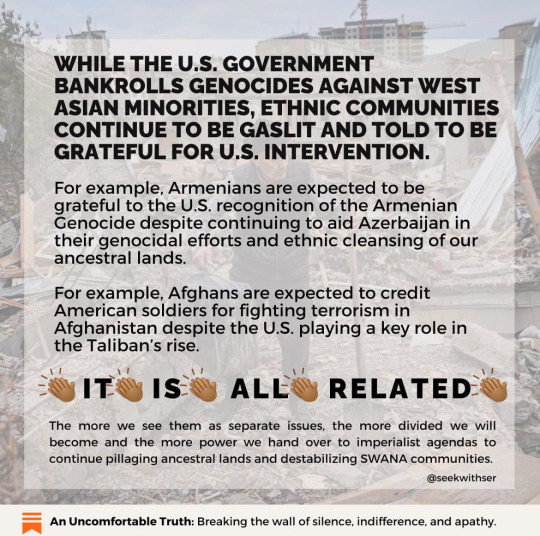



[ID: Screenshot of an Instagram post by @/SeekWithSer. The location reads, “Haut-Karabagh.” The title reads, “WHAT'S HAPPENING TO THE ETHNIC ARMENIANS IN NAGORNO-KARABAKH IS A RESULT OF THE WEST'S APATHY TOWARD S.W.A.N.A REGIONS.” The users Substack article is mentioned at the bottom, titled “Uncomfortable Truth: Breaking the wall of silence, indifference, and apathy.”
Slide 2 reads: I'LL NEVER FORGET WHAT SOMEONE (A WHITE PERSON) SAID WHEN I MENTIONED THE 2020 WAR IN NAGORNO-KARABAKH.
"ISN'T THERE ALWAYS CHAOS IN THOSE AREAS? IRAQ, AFGHANISTAN, THOSE PLACES ARE ALWAYS INFESTED WITH WAR AND DESTRUCTION."
This statement stuck with me because it represented the general apathy, indifference, and willful ignorance of the West toward countries we can't point to on the map whose names we can't pronounce.
And yet. AND YET. What we fail to realize (or conveniently ignore) is that our tax dollars are one of the most significant contributors to political and economic instability and PEACE in "those places."
Slide 3 reads: WHILE THE U.S. GOVERNMENT BANKROLLS GENOCIDES AGAINST WEST ASIAN MINORITIES, ETHNIC COMMUNITIES CONTINUE TO BE GASLIT AND TOLD TO BE GRATEFUL FOR U.S. INTERVENTION.
For example, Armenians are expected to be grateful to the U.S. recognition of the Armenian Genocide despite continuing to aid Azerbaijan in their genocidal efforts and ethnic cleansing of our ancestral lands.
For example, Afghans are expected to credit American soldiers for fighting terrorism in Afghanistan despite the U.S. playing a key role in the Taliban's rise.
IT IS ALL RELATED.
The more we see them as separate issues, the more divided we will become and the more power we hand over to imperialist agendas to continue pillaging ancestral lands and destabilizing SWANA communities.
Slide 4 reads: I'M NOT EXPECTING EVERYONE TO CARE ABOUT GLOBAL HUMAN RIGHTS. THAT IS YOUR PREROGATIVE.
BUT I WILL SPEAK ON BEHALF OF ALL SWANA COMMUNITIES THAT ARE HURT BY THEIR SO-CALLED ALLIES WHO WERE OUTRAGED OVER THE WAR IN UKRAINE BUT WHO CONTINUE TO TURN AWAY IN APATHY TOWARD THE PLIGHT OF THEIR COMMUNITIES.
Do they not deserve the same ounce of respect?
Have we collectively decided that their lives don't matter? Are they not worthy of the same rage and empathy that we've showed to our Eurocentric counterparts?
I IMPLORE us all to look at our hypocrisy. WE ARE COMPLICIT ABOUT THE SAME VIOLATIONS OF HUMAN RIGHTS THAT WE STAND AGAINST.
Slide 5 reads: ALLIES OF INDIGENOUS COMMUNITIES NEED TO BREAK THEIR WALL OF SILENCE, INDIFFERENCE, AND APATHY.
WE NEED COLLECTIVE ACTION AGAINST THE DIRE CONSEQUENCES OF COLONIZATION AND INSTITUTIONALIZED TERRORISM NOW.
INDIGENOUS ARMENIANS OF ARTSAKH ARE BEING ETHNICALLY CLEANSED FROM THEIR ANCESTRAL LANDS AS YOU READ THIS AND THERE IS NOT ENOUGH ATTENTION AND AWARENESS OF THIS HUMANITARIAN CATASTROPHE.
IF THE VALUES OF INTERDEPENDENCE, SOCIAL RESPONSIBILITY, AND ACCOUNTABILITY MEAN SOMETHING TO YOU, IGNORING THIS WOULD BE OUT OF INTEGRITY.
Slide 6 is a painting of an Armenian woman with tape across her mouth that reads “terrorist.” At the top, it reads: “seekwithser.substack.com.”
/End ID.]
#instagram#armenia#azerbaijan#artsakh#nagorno karabakh#indigenous#swana#southwest asia#south asia#west asia#north africa#bipoc#resources
58 notes
·
View notes
Text
alright i’m literally going to save this for when i go see my therapist again so um. no one needs to read or respond at all i just can’t sit up or grip a pencil rn so i’m laying in bed writing this. lol. please god i hope readmore works i am so sorry
it’s getting really dire out here. so i work part time at a cafe which is dying due to managerial neglect/chronic overstaffing/being under resourced and that pays me $12/hr plus tips. i’m still recovering from the time our espresso machine (which is. a major source of appeal for a fucking espresso based cafe) broke… the job that USUALLY ensures i have enough to live is now not enough. i also have two internships that total 25 hours per week and they’re both in separate but not unrelated fields that i’m Thinking about going into. both of which are relatively easier on my body and i like the work so far.
the issue is that i’ve been in my head for SO LONG about what kind of job i should be working. i was going to have a full spiral earlier today but thank god the shift ended lol. bc my coworker is a polisci/ethnic studies major, we were talking about positionality and the ways that academia, eapecially the western idea of “social sciences” (which is . what i study) exploita the communities it studies when not done with careful critical or community-based methodology. and as someone who wants to potentially join investigators studying the social ramifications of labor done in the specific context that i grew up in, from a worker’s and also generational and also academic jargon perspective (side note: i genuinely think there is a case for connecting the modern exploitative tourist hospitality industry to underserved communities’ ability to seek help and thrive like STRUCTURALLY in terms of the way these schedules are fucking built) i’m kind of… working my way up the ladder. learning research methodologies by doing that ground-level work and pushing paper for the PIs who actually do the Cool Work. AND ALSO STILL WORKING ON MY BACHELORS WHILE BEING A RENT PAYER … i also finally admitted to this coworker that i dropped out of the US east coast PWI i went to in order to come home bc i couldn’t handle it socially and i feel like. being a poc who has living relatives who worked on plantations and who is CONSTANTLY reminded that i have far more privilege than i could ever grasp etc is making me feel a little insane. like my dad Doesn’t talk to me about it because he does Not feel like articulating it and i’m Never going to understand which is true. like i will Never Understand. i should be a bit happier that the internships are paying me more just to sit and do brainwork instead of busting ass and people pleasing all day but i’m so afraid. of . being . incompetent. that i just work because i’m happy to work i need to feel useful i need everything to add up so bad. i need more than one full day off from responsibilities but i can’t afford it. i’m going to fall behind and not be good at anything and forget big theses if i can’t even pay rent. like what IS the point!! other more eloquent and better-equipped and driven people who know what they want should have it! i will just shrink my presence until i shrivel away!!!!!!!! god.
and then i feel the need to legitimize my hobbies and interests like bro 😭😭😭 who fucking cares if i miss the OT 5th anny people are drawing pieces bc they feel like it!!!
this is WHY i can’t chase clout this is why i didn’t go to risd this is why i dropped out of brown. so why am i still attached to the idea that i need to be institutionally validated (THERE IS MONEY IN INSTITUTIONAL VALIDATION. END UNDERPAYMENT I WANT TO KERMIT!!!!)
1 note
·
View note
Text
Book Review 27 – The Word for World is Forest by Ursula LeGuin

I’ve meant to read more LeGuin for a long time – I read Wizard of Earthsea in elementary school, the Dispossessed a few years back, and several volumes worth of Omelas discourse, but that’s about it – but I’ll be honest; I only grabbed this because I was desperately sprinting through shorter books to catch up to my reading goal and someone recommended it as being reasonably-sized. That said, I’m really incredibly glad I’m did.
The book tells the story of a stable, peaceful world being violently colonized by foreigners with a sharply limited understanding of its ecology and an (at best0 utterly condescending and dismissive attitude towards the native inhabitants. Eventually, all the atrocities give rise to a violent resistance movement among the colonized and, after a dramatic change in metropolitan politics destabilizes the colonial apparatus and several massacres, they force the (surviving) colonists to surrender and leave the world behind. The book ends on a mournful note, with the idea that the violence necessary to defeat the colonists has permanently tainted indigenous society, and the near-utopian idyll of their prior lives is now lost forever.
So! Can you guess that this book was written by an American in the early ‘70s?
But actually it was a fascinating read, if as much as a cultural artifact as as a narrative.
At it’s most basic – one of the two inciting incidents of the book is the Terran government the colonists answer to imposing a bunch of liberal reforms (ending slave labour and punitive expeditions and institutionalized rape, that sort of thing), and then ending up with the colonial establishment being split between a) those who seem honestly confused with why any of the natives have any issues with the continuing colonization, they’re being humane about it now! And b) the ones going full Rhodesian and treating being told to stop massacring people as the greatest tyranny inflicted in the history of mankind. All very authentically late-20th century.
The representation of Terran culture was an intriguing mix of futuristic and totally unchanged, as well. Earth was apparently entirely ecologically fucked and in dire need of organic materials (hence the desperate colonization drive), a prediction that hasn’t aged a day. Race exists, but the categories have gotten scrambled and rearranged, and is only at all salient in the mind of the local bloodthirsty ultracolonialist fanatic, whose sense of terran solidarity lasts exactly up until he needs people to blame (and, given the callouts to the Vietnam war that abound through the thing, not accidental that his intra-terran racism is all directed towards Asians).
Though there’s something to be said for how viscerally unpleasant the head of the villain is to be in. Closest comparison that comes to mind is the Victorian chapters of A Song of Ice and Fire? He’s a real piece of shit.
Something very modern about the conceit that men of all creeds and colours will unite around a grand shared enterprise of brutally oppressing and exploiting ET instead.
Men, specifically, because the Terran colony as we see it is basically drowning in machismo. The only women involved in the enterprise are either mail order brides or sex workers, and I don’t believe any one of them gets a name or more than a line of perfunctory dialogue anywhere in the book. Their whole purpose is, basically, to represent the possible entrenchment of colonialism by the establishment of a self-sustaining population, and then to be massacred to a woman by the Athsheans to avert just that possibility. (The book’s portrayal of warfare is pretty thoroughly unsentimental like that on all sides).
Also an interesting cultural artifact – the fact that the multiple intelligent humanoid species are explained as all actually being human, the result of some prehistoric precusor species spreading the species around different worlds who would then reunite with each other as they reach the stars. I have the strong impression that this was a pretty common trope back then, but it’s one you essentially never see in modern sci fi. Not a clue why, but interesting way tastes have changed.
The Athsheans themselves are interesting as an invented culture, with their mystical and constant dreaming and their odd gender roles, but they also are very nearly the platonic ideal of the whole ‘morally pure noble savage’ archetype. On the one hand, they – with the exception of a few very rare forms of mental illness – even have a concept of why someone might consciously choose to kill another human. They resolve most interpersonal disputes by singing at each other. They live carefully in tune with their natural surroundings, and have no need for plantations or mines or factories. And so on.
And on the other hand – they have no history. The way everyone does things and the way society is structured stretches back beyond the bounds of memory, and the entire world has basically one more-or-less-homogenus culture where every band has the same basic socio-political organization and the same theology. The one sympathetically-portrayed colonial anthropologist call them perfectly evolved for their environment and so stagnant, and one rather gets the sense that he’s supposed to be right about everything except the value judgment. And so the greatest tragedy of colonialism is shown to be the moral corruption of the Athsheans, brutalized out of their prelapsarian dream and forced to become murderous to regain their freedom. It is, honestly, a trope I don’t much care for.
(It’s an idle thought I don’t really know what to do with, but the Athshean concept of gods – dreamers who bring ideas and concepts from the dream and incarnate them in the material world – also kind of reminds me of the Innocences in Disco Elysium?)
Anyway, LeGuin still is a great writer, and this really was a fascinating read.
57 notes
·
View notes
Text
Boomers are autistic/ADHD too
Yanno what I’m just saying it and maybe I’ll get called a traitor or whatever but that doesn’t stop this from being a distinct possibility: there’s a lot of untreated, undiagnosed, unacknowledged ADHD and autism among boomers. I notice it every single day and I can’t believe more people don’t talk about it.
Stay with me because this gets long.
They didn’t know shit for shit about the brain when boomers were children. Hyper or “disobedient” children were beaten or given some other utterly useless and frequently detrimental punishment. Institutionalization was considered totally acceptable in moderately severe autism cases. Therapy as we know it was typically reserved for people who were so cripplingly traumatized in some way that there was literally no other choice. It was usually damage control after the fact, not intervention.
Yes, autism and ADHD have some form of research history spanning several centuries, but your average regular person didn’t know that (and still doesn’t always, since the 20th century is often egregiously known as the century of “new” medical “fads”). Your average doctor didn’t necessarily know about it. It was a relatively fringe topic, so not all psychiatrists/psychologists learned it because it was a blip (or nothing) on the syllabus unless maybe you were specializing in children or developmental disabilities (and there......really weren’t a lot of either such specialist up to a certain point :///).
Everyone else affected by it but deemed functional or marriable enough to try living in the world just dealt with it, for better and worse. Many of the blatantly obvious signs we now use for diagnosis were lumped in as a personality type/trait at best or an intelligence marker at worst.
And I get where that comes from......sort of. Brian is a persistently loud talker, Amy is deeply claustrophobic, Sam gets nervous easier than some other people, Alex needs a tiny bit more time to hand copy an address. Who is ND on closer investigation? Maybe all, maybe none. You can show a few signs without them being part of a big dire diagnosis conspiracy. Far be it for me to try to call someone something they’re not.
But given how many people are disregarded or misdiagnosed in general for anything medically-related whatsoever, it’s too easy to use that line of thought to dismiss a legitimate case or just plain avoid a problem.
Some affected boomers thrived and found careers that valued (and even normalized!!) hyperfocusing, attention to detail, channeled hyperactivity, etc. (LOOKIN AT YOU, COMPUTER ENGINEERS AND VARIOUS TECHIE INVENTORS). Some of them had/have somewhat chaotic or strained home lives, but for all intents and purposes, they do or have done at least some of what they wanted to in life.
But many others didn’t. Think about all the kids who were called “unteachable” so they barely finished high school (for fuck’s sake it was hard to even get humane tutoring for dyslexia), could barely ever keep a job, and in some cases weren’t truly prepared for having kids because they struggled to take care of themselves as it was.
Think about the stay-at-home moms who turned into lowkey addicts or alcoholics to escape feelings of uselessness/insignificance simply because sometimes they forgot to or couldn’t do something that day and everyone around them shamed them about all those little things for years or decades. We like to joke about yuppy drunks (and yes that was/is a real problem), but it wasn’t always about disgusting social habits.
Many of that generation blames the problems they’re dealing with right now on age, and that’s a close enough approximation in practice that a lot of people don’t dispute it. To be fair, age does really do that shit to people: you forget things easier, you can’t always finish a task but you’re not sure why, you don’t always have the energy you want/need, etc. Sometimes age is just age.
But I remember differently. I remember seeing those things because I was dealing with them too and couldn’t understand why the grownups were so upset at themselves when actually mistake XYZ wasn’t really a huge crisis and wasn’t a big deal – because there were double standards, both external and self-imposed. No one questioned them much with me – a small child at the time – but they were a big shitting deal when it came to an outwardly functional adult. I remember all the oddities, quirks, and problems that these people were dealing with as young as their late 30s in some cases.
That’s not age, it’s a goddamn brain issue. Age is now complicating things, yes. But so many want to pretend that they were completely normal before they turned 50 or 60 or whatever, at which point they promptly and swiftly had an overnight change. That’s not fair to anyone. It’s emotionally ruthless and medically sloppy, and yet a lot of them go on believing it anyway.
I genuinely feel that this is a reason why some boomers are so baffled or disbelieving of ND issues in their own kids and their kids’ kids. They can sometimes see younger generations’ problems in their own lives and even relate to them, but they’re so used to it – and in many cases, got zero help in learning how to manage it – that they don’t get what the big deal is about shoehorning people into miserable, unhealthy, or borderline hazardous life patterns. They assume that the massive struggle, intense frustration, and subsequent other negative health side effects are just….part of life and you either sink or swim.
And I…....kinda get that mentality because putting stock in “no excuses” does push some people to do better?? And yes you should be mindful of self-imposed excuses stopping you from doing things??
But now that overall lack of acknowledgement means that we have multiple generations who still default to believing that most of their problems are solely voluntary and conscious decisions, always and exclusively their own fault, something that they “could” just walk away from forever if they “chose” to.
We have multiple generations who still assume that they’re alone in their problems and even that they kind of deserve shitty or abusive behavior from others because they’re “bad” and “should have seen it coming” or “need to smarten up.”
We have children and grown-ass adults alike who are totally unprepared to deal with lifelong problems on top of things like broken economies and increasingly demanding neurotypicals’ social standards (because yeah, even though us younger folks warmly welcome things like the shift from calling to texting, that can still reach absurd levels of maintenance and anxiety because now the older generations assume that just because a few people are extremely “with it” that the rest of us are too).
And all because some people are so terrified of labels that they’re also willing to totally deny the existence of some very real medical stuff even though they themselves might be dealing with it.
I’m not trying to excuse crappy parents, bad home environments, bad education experiences, or anything else negative. I’m also not trying to blame all of psychology’s faults on one generation.
I’m just saying that it’s not that surprising if you really stop and think about it.
Psychology and neurology have come a long way in a fairly short time (granted it still needs to go much further, but at least we’ve started) and it kinda makes you wonder if things would be different now if our parents and grandparents had known then what we know now.
ASD doesn’t have an age limit. Just because it’s close to impossible for some people (especially borderlines and maskers) to get a formal diagnosis once they’re legal adults doesn’t mean it doesn’t exist at 30, 40, 50, 60, 70, or 80. It’s more a question of whether anyone bothers to, well...ask questions.
So yes, some people are just unapologetic assholes who don’t want to hear the truth or entertain any notions other than their own, even after being presented with hard evidence. They’re obsessed with normality, sometimes to the point of fetishization. Fuck them entirely, I agree.
But don’t assume that the younger generations own the copyright on neurodivergency. We just happen to live in a time when it’s starting to be less deniable so some of us can take action sooner to deal with it.
#asd#autism#adhd#adult autism#boomers#adult adhd#generational problems#baby boomer generation#boomers vs millenials#boomers vs gen z
51 notes
·
View notes
Text
What happened to Sherlock? Part IV – Heartbreak and coma (2)
This is the second post of the fourth installment of my meta series where I try to use Sherlock’s own methods to find out what’s happened to him in the show; you can read the first one here. This is about my hypothesis #4: At some point in time between TSoT and HLV, Sherlock takes an overdose of drugs and ends up in coma. In the first post I tested a prediction to try to verify the coma part. Here are the remaining four predictions that I’ll test the same way, corresponding to the rest of my hypothesis. Since this post won’t make much sense unless you’ve read the first one, and since this is also a monster-post, I’ll put the whole thing under the cut, except for this picture of a comatose hospitalized Sherlock in TLD:

Disclaimer: If you feel the subject matter upsetting, please don’t read further - take care and stay safe! I also want to state that no matter what happens in S4 - like nurse Cornish said in TLD, I’m fully convinced Sherlock will survive this. He will pull through and solve The Final Problem - staying alive.
Prediction #2: It will be possible to deduce from events in the show that Sherlock might have harmed himself, and even overdosed.
Observations: There are some scenes - mostly in TAB and TLD - which indicate that Sherlock’s state of health might indeed be self-inflicted (at least on the surface). The most obvious ones, in my opinion, are:
1. Sherlock’s OD in the airplane scenes in TAB is treated like a fact, but people aren’t acting accordingly. The case is complete with backstory from Mycroft, Dr Watson saying this cocktail of drugs could kill Sherlock...

...and assassin nurse ‘Mary’ suggesting he should be in hospital. And we know from TBB that John has specialist skills in being “able to recognize and give immediate and appropriate treatment to a wide range of medical and surgical conditions including --- poisoning/overdose” (among other things), because this is explicitly stated in his CV. It’s also obvious in this scene that Sherlock has administered the drugs on himself.
But the obviously logical procedure after his OD - taking Sherlock to hospital to try to restore his body functions and maybe save his life - does not happen; no-one disputes Sherlock’s decision to not receive medical treatment. So here we have a person who might just have tried to take his own life with a potentially lethal dose of drugs, but Dr Watson doesn’t even examine him. It’s glossed over as if nothing serious has happened, and no-one reacts properly to it; Sherlock himself acts as if he’s already miraculously recovered, and the others just let him carry on. This is not realistic, it’s not how an overdosed person possibly could behave. Which indicates that this is all taking place inside Sherlock’s brain; it’s Sherlock who wants to gloss over the serious consequences, even though he feels ashamed. Conclusion: the emphasis at Sherlocks OD as such might mean it’s true, but the timeline might be warped and the reactions following the OD twisted because of Sherlock’s drug-induced state.
2. In S4 there are references to self-harm marks on both Faith’s and Sherlock’s arms. The scenes in TLD where Sherlock talks to Faith about self-harm, deducing that her relationship had ended, that she wasn’t ‘getting any’, that she must have scars of self-harm on her left underarm and that her ‘boyfriend’ didn’t notice, are very telling:
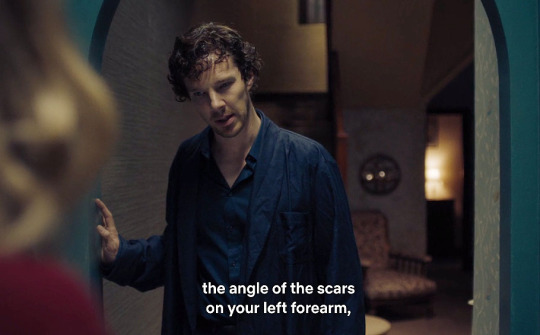


But if ‘Faith’ was actually Euros, what was her purpose of first making Sherlock think she was suicidal and then just disappear? I see it as more likely that this is all about Sherlock processing his own relationship with John. Sherlock might have been sexually frustrated for a long time, because nothing ever happened between them. But at the same time Sherlock wasn’t really in touch with his feelings and basically horrified to ever talk about it with John (greenhouse scene in TAB is testimony). It’s possible that Sherlock had started using again when John had decided to get married (like he did in canon) and had scars of the syringe on his left underarm, but John didn’t notice this, because he wasn’t there. ‘Self-harm’ in this case equals drug use.
3. Nurse Cornish tells John in TLD that Sherlock has ‘made a mess of himself’, when what we actually saw was John assaulting him.
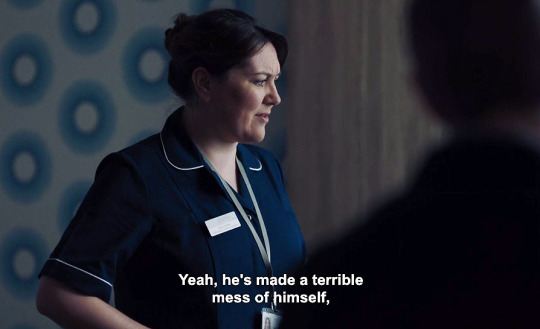
But why would the nurse in charge blame the victim in front of the perpetrator? And why all this glossing over the fact that John Watson attacked and beat up his friend to the point of hospitalizing him? Sounds very much like Sherlock’s guilt to me, like he’s actually processing the consequences of what he’s done to himself (his OD) in his Extended Mind Palace.
It also seems like Sherlock is re-hashing things in his EMP, because we already have a scene from the very first episode, where someone accuses Sherlock of having ‘made a mess’:

4. In TFP we learn that Euros cut herself when she was a kid “to see how my muscles worked”. The parents thought it was a suicide attempt. But little Euros is standing here between them, as if the case was being analyzed in Sherlock’s Mind Palace.
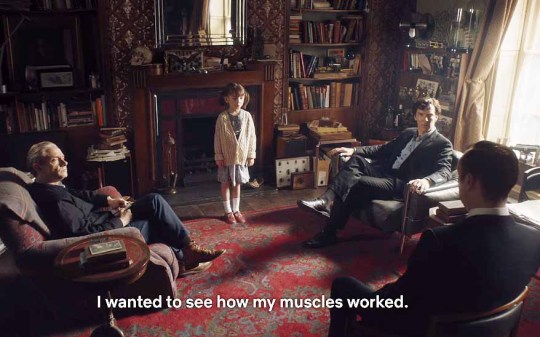
So what if Euros is actually a part of Sherlock himself? If S4 all happens inside Sherlock’s head, this could very well be the case. Which means that Sherlock might have been the one to harm himself as a kid.
5. As I’ve tried to show in this meta, suicide is one of the major themes in this show. It has been referred to or implied so many times, rubbed in so thoroughly, that it’s rather upsetting. This is a very serious topic, and I doubt the show-makers intend to treat it lightly. I’d rather believe they want to catch our attention with it, to contemplate the dire consequences to other people of Sherlock’s OD. Just like I think Sherlock himself does in TLD, when he warns ‘Faith’...
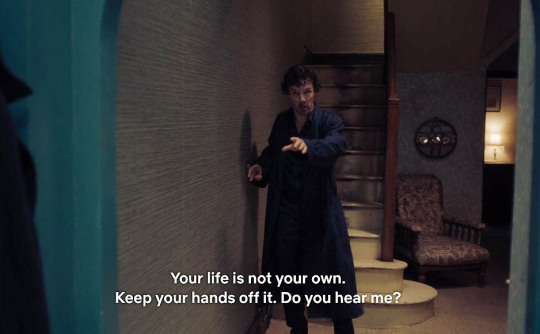
...and throws her gun in the Thames...

...and argues the point:

6. And then there’s ACD canon. Before Holmes ’falls’ with Moriarty in the Reichenbach Fall (The Final Problem) he leaves a note to Watson (= a classic reference to suicide). It’s believed that Doyle’s intention was to let him die and end the story with Watson living an ordinary life with his wife and only nostalgic memories left from his time with Holmes. But the fans protested and insisted for years until ACD ‘resurrected’ Holmes and published new stories. So if ACD almost ‘killed off’ this great character in canon, wouldn’t it be rather canon compliant of Mofftiss to almost do the same thing? One of the canon stories is also named ‘The Dying Detective’, but in BBC Sherlock they’ve changed the name to ‘The Lying Detective’ - maybe in order to not make it too obvious?
7. On a meta level, would there be any reasons for the character of Sherlock Holmes to try to commit suicide? Well, yes; I think there are plenty of hints that there might be. And I believe @tjlcisthenewsexy puts the finger exactly on those reasons in this excellent meta (my bolding): “If a person takes their own life due to depression directly caused by a heterocentric culture and institutionalized homophobia, then is it really suicide? Or is it murder?” I think this issue was raised by Sherlock already in the first episode, albeit in a slightly less obvious way; the victims of the serial killer were persuaded to take their own life when the killer put pressure on them.
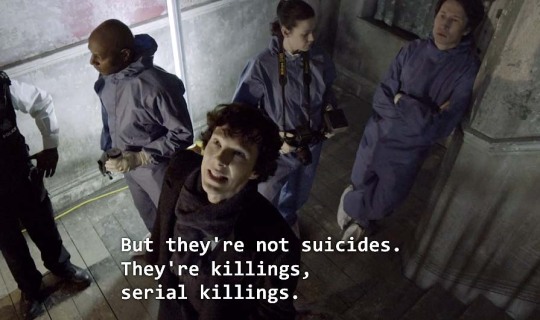
Same thing basically happened in TRF, when Moriarty pressured Sherlock to jump. And in HLV when Lord Smallwood committed suicide after CAM (=Media as a villain) put pressure on him with blackmail. But the real culprit isn’t the victim; it’s society’s norms and attitudes that pressure them. The issue of homophobia isn’t of course openly addressed in BBC Sherlock, but I think it’s heavily implied for us to read between the lines.
Prediction #3: There will be abundant references to Sherlock’s drugs use, since this is the proximate cause of his state and therefore constantly on his mind.

Why do we see an IV drip with morphine in HLV? Well, this is the episode where Sherlock gets shot in the chest, so naturally he needs morphine as painkiller… But wait a minute; wouldn’t his brother have informed the hospital staff of the risks of giving Sherlock morphine, seeing as he’s a drug addict? And then there’s Janine’s comment:

Observations: There are several drug-related things in HLV that don’t really make sense.
Firstly, after knowing him for merely a month, Janine seems to be very much aware of Sherlock’s drug dependence. But if she is already this knowledgeable, why did he have to tell her that he had been ‘working’ when he had actually been sleeping in a drug den (and she seemed to buy it)? But if she didn’t know about the drugs, who had suddenly told her now?
Secondly, for some odd reason, Sherlock’s drug use seems to be a far bigger issue than his shot wound. A gun is used three times in HLV (twice on a human). But there’s a whole bunch of different drug use references, most of which have to do with Sherlock: a) Isaac Whitney, b) Sherlock found in a drug den, c) Sherlock’s blood tested for drugs at Barts, d) Mycroft gathering Sherlock’s ‘fans’ to search 221B for drugs, e) “Don’t appall me when I’m high”, f) IV morphine drip, h) Janine’s comment about drugs being Sherlock’s dream, i) CAM ‘reading’ opium and morphine as pressure points for Sherlock, j) Mrs Hudson ‘running a drug cartel’ and k) Sherlock having Billy drug his whole family. So there are far more references to drug use than to Sherlock almost dying from a gun shot, which is glossed over; no-one seems to really care about his shot wound or chest pain until he falls apart. Mrs Hudson doesn’t seem overly worried when she learns Sherlock has escaped from the hospital. John - his doctor friend - even yells at him to shut up, and threatens to kill him, when he’s supposedly already dying for the second time:
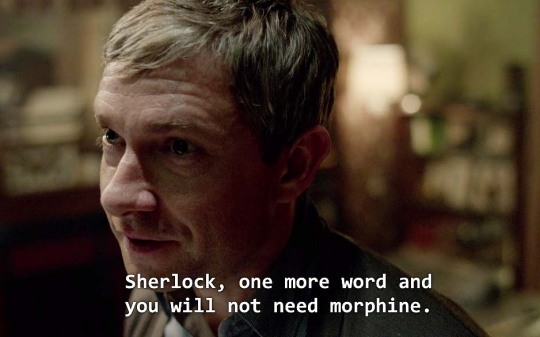
And Sherlock himself starts to talk about ‘surgery’ and the murderer calling the ambulance and other pieces of absurd, illogical nonsense to gloss over the shot wound, which is now threatening his life again. While at the same time claiming that his drug abuse is actually real; he only solves crimes as a substitute for being high...
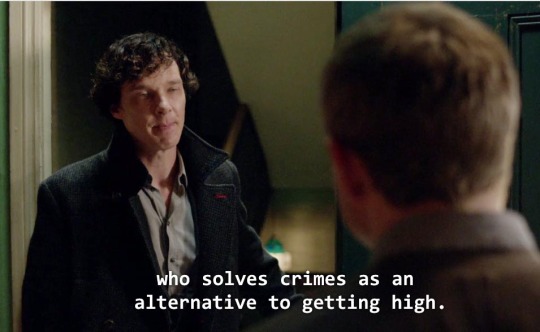
At Christmas in HLV Sherlock’s own parents are fussing more over pregnant ‘Mary’ than over their own shot-wounded son. He’s fresh home from months in hospital but doesn’t even move strangely. In hospital he had only a plaster over the shot wound, no bruising visible. This is not realistic in my opinion; if Sherlock was really shot wounded, he wouldn’t have been able to escape by the hospital window in the first place. How did he manage to bring the wheelchair with him, by the way, complete with attached IV-drip of morphine?

The idea of Sherlock risking his life again; all this mystic, dangerous and elaborated scheme to track down ‘Mary’ and confront her with her crime - and for what? Only to then dismiss the shooting as ‘surgery’ that ‘saved his life’ in order to persuade John to stay with her? It’s just not credible; this is more reminiscent of an action movie (Bond?) derailing into absurdity. I think what all these signs tell us is that Sherlock’s real problem isn’t the supposed shot wound; it’s a drug-related problem.
So, now that we’ve established at least the possibility of Sherlock having OD:d on drugs and ended up in coma as a result, we arrive to the point of determining more precisely when it happened.
Prediction #4: If Sherlock falls into coma, there would be a credibility change/difference between ‘before’ and ‘after’ the OD.
Now this is a hard one, because in BBC Sherlock there’s generally a very subtle line between ‘reality’ and ‘imagination’. There are a series of weird events in the whole show that I find it hard to believe in, and many of them happen before HLV…
Irene’s mystic break-ins into 221B which no-one had noticed (ASiB)
Sherlock being visited by Moriarty at 221B after the trial in TRF, before even John got there
Sherlock having a conversation with Moriarty on the rooftop in TRF (how did Sherlock predict that Jim would have him jump off a rooftop in particular and therefore made his arrangement of faked death based on this?)
Anderson’s sudden metamorphosis into being Sherlock’s fan-club (MHR)
Torture scene in Serbia and Mycroft’s cruel behaviour there (TEH)
Soldiers who don’t feel when they’re being stabbed in the back in TSoT. (This is such a crazy idea, and the given explanation we have is hard to believe)
These things are weird and not very realistic, but at least they might contain a grain of truth somewhere, albeit dramatized. But in HLV and onwards it does get far worse, in my opinion, when people start acting way out of character or doing absurd or outright impossible things. These could be signs that the events from HLV and onwards are fabricated by Sherlock’s brain, rather than representing ‘real’ things that have actually happened.
Out of character As for acting OOC, I think John’s behaviour has some ups and downs in the show, but in HLV he gets abominable to a point of no return; the idea that he would stay together with ‘Mary’ after she shot his best friend is highly unbelievable - pregnancy or not (in fact it’s even less believable that John would find an assassin, who should be in prison and who attempted to kill his friend, fit to raise their child). And the top of the mountain then comes in TLD, when John assaults Sherlock and acts as if it’s all Sherlock’s own fault. No credibility left.
But I’d still say that it’s an even bigger OOC development to have the world’s most famous detective stop solving crimes and start committing them instead.
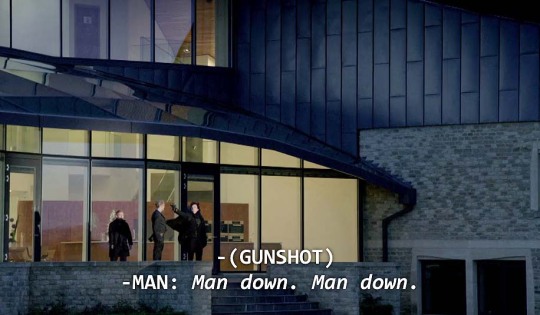
Because as far as I can see, crime solving ends with TSoT; after that, Sherlock doesn't solve a single crime case that hasn't directly to do with his own private life: • He fails to solve lady Smallwood’s blackmail case, which instead ends with lord Smallwood's suicide.
• He fails to capture CAM, the criminal who caused this; instead he murders him. The famous crime solver is now a criminal instead. • He fails to solve Emilia Ricolettis case in his own mind; the person he thought was guilty turns out to be Moriarty instead - who is supposed to be dead. • He fails to solve the mystery of why Moriarty's ‘Miss me?’ video is on every screen in the country, which was supposedly the reason for bringing him back to London. • He fails to save a single one of the Thatcher busts from destruction and why would he want to do that anyway; he even smashes the last one himself! • He fails to find the stolen Black pearl of the Borgias; instead he finds the AGRA stick from Mary's assassin gang. • In a highly doubtable deduction sequence without any kind of evidence, Sherlock decides that Charlie Wellsborough's death is no crime at all; he just had an unfortunately badly timed “seizure” in an extremely weird situation. • He fails to solve the Norbury case, which would exonerate ‘Mary’ from accusations of treason; instead ‘Mary’ dies in a most incredible and over-dramatized way which is physically impossible. • He tries to prove that Culverton Smith is a serial killer, but the only thing he manages to prove is that Smith can try to kill him, Sherlock, on his own request. Supposedly, Smith 'can't stop confessing' after that, but we never get to see or know any of these confessions. • The rest of the show (TFP) is exclusively about Sherlock's own family problems. The only 'outsider' crime cases he tries to solve - his sister's death threats against Sherrinford's governor with wife and the three Garrideb brothers - are complete failures; they all die. He believes he saves Molly's life by forcing her to confess that she loves him, but Euros tells him there was never any danger. Failure again. This is rather far away from canon, where Holmes kept solving crimes even after retirement, isn’t it?
But in this show, after TSoT, there’s only one thing that the genius detective manages to do right: he saves John Watson from the bottom of a well. By solving a puzzle.
So yes - I think these things show a huge difference in credibility between 'before' and 'after' TSoT; the world's most famous detective has stopped solving crimes! (But what about all the cases that were supposedly solved by Sherlock 'spinning plates' in TST, you might ask? Not to worry, I'll get back to that later ;))
As for HLV, I think this is the episode where things start getting completely out of control for Sherlock, indicating that he is actually no longer conscious. Which would mean he doesn’t experience new events in the show’s reality, but his brain keeps re-hashing memories, combining them in new ways to solve Sherlock’s personal problems. Apart from the OOC arguments explained above, I tried to point out a series of others in this meta, connected to Janine’s character. We haven’t seen much of her, but in HLV she appears to be a person with less than average intelligence, which I think she didn’t in TSoT:
Why would Janine risk her employment to let Sherlock sneak into her boss’ high security office at night when she knew he was there?
Why would Janine believe that Sherlock would propose to her after they had known each other for a month and he had just left her waiting for him the whole night in his flat without knowing where he was?
If Janine and Sherlock haven’t had sex (because of his reluctance), how come she all confidently just gets into the shower with him?
How can Janine miss out on all the mayhem at 221B - a ‘drugs bust’ with several people present, Mycroft being slammed into the wall, Sherlock talking about her boss as a monster, etc.?
Janine just doesn’t behave in a logical manner in HLV. It. Doesn’t. Make.Sense.
Impossible The first outright impossible thing I can spot, is ‘Mary’ getting into CAM’s office faster than Sherlock. Sherlock makes a whole lot of effort explaining to John that the only way to get into CAM’s office is by his private lift, and just how difficult that is.

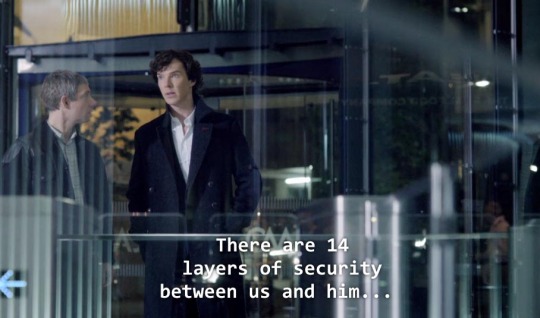
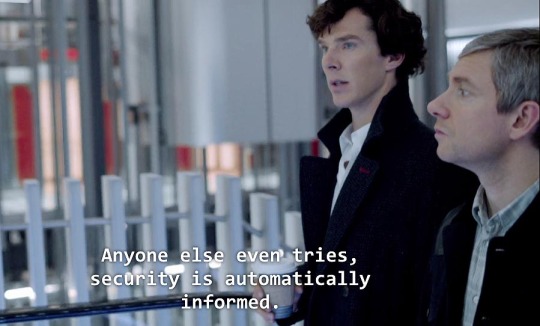
Anyone who tried to climb up wouldn’t just need the agility of a circus artist like the ‘spider’ in TBB; they would have to climb the façade, break into the flat and knock two people down in basically no time. I think we can safely say that it’s physically impossible to climb a building of 32 floors and manage all that in less than 45 seconds (which is the time it takes for Sherlock and John to go up with the lift after Janine has let Sherlock in).
Some people may want to talk about ‘artistic license’ here, and claim that this is just entertainment, this is just the show makers twisting reality a bit to make their show more exciting. But don’t forget the major weakness of this argument: if we excuse one clearly impossible thing with ‘artistic license’, then we must be prepared to excuse all of them the same way. Which means that the whole rational basis of Sherlock Holmes’ own methods in this show becomes invalid, because then there are no deductions to be made, since nature laws and reality as we know it don’t exist ‘in-show’. Which could very well be the case, as I see it, if nothing in this show is meant to make sense - or if there’s still a coherent plot-line somewhere, but the events we do see are mainly taking place inside Sherlock’s head. But my idea here was still to try to pinpoint a change, a difference in levels of weirdness, between ‘before’ and ‘after’ Sherlock’s presumed OD.
Prediction #5: There will be time- and place-references that coincide with a possible OD directly after TSoT
If Sherlock would take to kill himself, where would it happen, when and how?
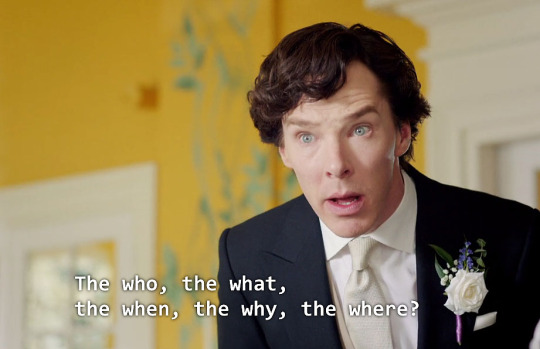
Well, I think Sherlock already explains it to Lestrade in this ‘script’ from ASiP published on BBC’s website, where we get this (supposedly) cut out scene:

In other words: Sherlock would kill himself, but in a different time and place, presumably a) after leaving a note and b) after some ‘prior sign’s. And c) he’d do it in a familiar place that means something to him. So, to track down the point in time when Sherlock might have done this, we need to determine a) when he has left some kind of note and b) what ‘prior signs’ that could have preceded this.
Observations
Point in time: As for a), in TAB, after realising that Sherlock has OD:d, we learn that he has made a list of all the drugs that he’s taken; a promise to his brother since years ago. That’s a kind of note – isn’t it? A note that could help saving his life after an overdose.
But there are also hints that TAB isn’t the real time of the OD event:
JOHN: He couldn’t have taken all of that in the last five minutes. MYCROFT: He was high before he got on the plane. MARY: He didn’t seem high. MYCROFT: Nobody deceives like an addict.
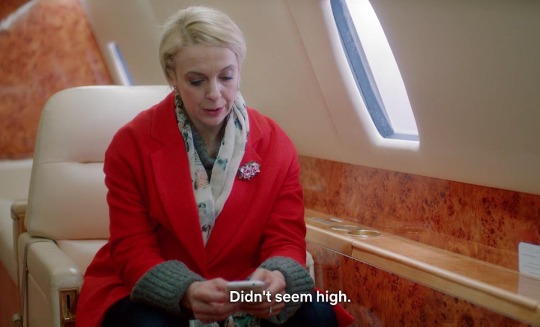
But wait; could Sherlock really have overdosed on drugs and after that performed the whole scene at the tarmac? Where he says goodbye to John, jokes with him and makes a whole little coherent speech about the Game and the East Wind? Not very likely for a person who has OD:d if you ask me…
And then there’s also the fact I pointed out in my last meta (X); that Mycroft talks about this OD coming after a ‘week in solitary confinement’ when Sherlock was locked up with his worst enemy - himself. I think this week could well be the time John was on ‘sex holiday’ after the wedding. If the shooting of CAM wasn’t real (which is supported by the easiness with which Sherlock gets away with murder without any kind of lasting consequence), neither has there been any imprisonment. I can rather imagine Sherlock isolating and locking himself in at 221B for a week, trying to alleviate his pain and heartbreak with drugs after John’s wedding.
Regarding the turn of events after a presumed OD which we don’t actually see, @sagestreet has made a whole reconstruction of how the things could possibly have happened in one of the additions to this meta (please scroll down to the subtitle “TIMELINE FOR A POSSIBLE OD-AFTER-THE-WEDDING SCENARIO”.
There’s also a note playing a central role in TLD, and I’ve tried to elaborate on this in these two metas: (X, X). The episode TLD seems to take place long after John’s wedding, when he already has a daughter. But what if this is actually not the case? What if the whole of TLD just represents Sherlock’s brain going through events that actually happened immediately after the wedding? (Or even immediately after his faked suicide, in some cases)?
Geographic place: The whole sequence in TLD about Sherlock isolating himself in 221B, resorting to an intensive drug abuse that is basically killing him, could be showing what really happened with him directly after the wedding. John has (supposedly) abandoned him (honeymoon?) and he’s turning nuts, talking to himself (Billy Wiggins), shooting the walls and playing out a Shakespeare drama all by himself.

221B would also fit with c), ‘a familiar place that means something’ to Sherlock. The events might in fact be showing some kind of reality, perhaps it’s just the time of them that is twisted and misplaced. Which would seem likely, if this is Sherlock processing his distorted memories of those events inside his still drug-addled brain. On the other hand, the prison where he allegedly would have taken the drugs and got high, before meeting up at the tarmac to board the airplane; none of these places would have the slightest personal meaning to Sherlock, would they? So where exactly is he more likely to take an overdose according to the deleted scene manuscript; in prison or in 221B? I think the answer here is clear.
Prior signs: Regarding b), I’ve already talked about the signs of self-harm in TLD that John doesn’t seem to either notice or acknowledge. The drug abuse is one clear sign of self-harm, but there’s also more subtle things, like Sherlock basically abandoning his job (which he was supposedly ‘married to’) to take over John’s wedding planning; something he would normally find mundane and probably despise. He even tells John’s and Mary’s wedding guests in his speech how utterly useless the ‘wedding tradition’ is. So why does Sherlock even do this? John and Mary would be fully capable of planning their own wedding, wouldn’t they? I think it’s a form of self-harm, self-punishment or maybe even self-imposed martyrdom - “a cross I have to bear” as he tells John, referring to his ‘ordinary’ parents.
The ‘delayed backstabbing’ in TSoT also makes for a dramatic metaphor about what happens to Sherlock; if he’s the un-seen murder victim of this wedding, the effect of it doesn’t play out until afterwards, when he’s left to his own gloomy thoughts and feelings of abandonment in 221B. Which would mean the delayed back-stabbing was a prior sign to Sherlock’s later ‘bleed-out’.

It’s also interesting to speculate about exactly when this actual back-stabbing took place. We never get to see the wedding act in TSoT, but we do see the moment when it dawns upon Sherlock that Mary is pregnant. I think Sherlock’s realization of her pregnancy is the last nail in the coffin; that's what ultimately breaks his heart. It’s not until after this moment that Sherlock leaves the party; a marriage can be dissolved, but a child is a child and it will always be John’s responsibility. Which basically means the definite end of their crime-solving life together...
But I think the most important piece of evidence about the time of Sherlock’s possible suicide attempt taking place immediately after John’s wedding is this:
John’s blog stops updating at this point. The blog also took a pause after TRF, but the current gap is definitely the longest. All this time we’ve had John’s blog as a more ‘sober’ account of the events; a ‘second opinion’, if you like, to what I believe the show is: Sherlock’s more colourful and dramatic tale of their life together. Sherlock hacks the blog and posts one last instalment before the blog dies completely. I believe this last post can be seen as Sherlock’s ‘note’, which I’ve tried to explain in these two metas X , X.
But what about the blog cases of S4? In TST we see a lot of cases listed by John’s supposed blogging; so many in fact that John tells Sherlock that he can’t go on ‘spinning plates’. Yes, it sounds promising, but since a) John is typing on a jpg-file (which is technically impossible, unless you convert it to or integrate it in another format),

and b) there are no references on the real blog to these new ‘cases’, I’d say that none of these cases are realistic. Which probably means they are fabricated by Sherlock’s brain - some of them are even rip-offs from old cases, like The Six Thatchers.
Last but not least: on a meta level, is there a certain significance to TSoT as an episode that makes it a good time reference for being the point after which Sherlock passes to a comatose state? This analysis isn’t mainly intended to reflect a meta level of the show, it rather focuses on the textual level. That doesn’t mean, however, that I find the meta level unimportant. There are quite a few tumblr analysts that have expanded on the form and shape of this show; its ‘messages’, arguments and conclusions on a meta level. For example, @garkgatiss has published several very thorough analyses of the overall pattern of BBC Sherlock as a five-act drama. In the latest one, dedicated to analyzing Bond and Hannibal references, @garkgatiss points out this about the symmetry pattern of S3 (my bolding):
“S3 doesn’t follow the same Bond/Hannibal triad structure as S2 and S4, and we shouldn’t expect it to. Nevertheless, we still find Bond and Hannibal in TEH and HLV — TEH ‘revives’ the myth of Sherlock Holmes that was destroyed in TRF when Sherlock returns from being dead and proves he was not a fraud after all, and HLV gives Sherlock the Clarice Starling creation myth, as befits the true hero of the story. TSOT, as the overall midpoint of the show, serves its own distinct function in the story that I plan to cover in full at some point, but not here”.
So, TSoT represents the midpoint of the story. It’s also the point after which, I believe, Sherlock enters his comatose state and resorts to pure speculation about the future. Or, should I rather say, he resorts to modeling the emotionally devastating consequences of his own choices, in a series of worst-case scenarios, which are basically S4, but start already in HLV. Which would mean yet another indication of the story arc being symmetric, with the figurative ‘murder case’ in the middle; Sherlock’s heart breaks when John not only marries ‘Mary Morstan’, but even starts a family with her. Because Sherlock’s discovery in TSoT of ‘Mary’s pregnancy will (in Sherlock’s mind) most certainly mean that John’s days as a companion to Sherlock’s crime solving are counted. A responsible father wouldn’t run around risking his life on a daily basis, would he? So yes - to me TSoT undoubtedly marks a midpoint in this story.
So, to sum it up once again: my belief is that this show is totally happening within Sherlock’s head, from his PoV. But there’s a distinction between what happens before TSoT and after; in the former case Sherlock voluntarily goes through his memories with John, based on reading his blog. In the latter, I think Sherlock’s body is in coma due to an OD, but his mind is racing, thus the extra weirdness.

Summary
In brief, I think Sherlock Holmes has some serious stuff that he needs to deal with, and so has John Watson, even if maybe Sherlock’s issues are the worst. And in S4 Shelock does; he goes from being someone who constantly tries to detach his brain from its inconvenient ‘transport’ of a body, to someone who ultimately allows himself to care deeply and truly. And I believe that’s basically what this show is about: the long and winding road to freedom, the mental journey home to 221B. And on this inner journey, he has to go through hell, which means pain, heartbreak and loss, but also insight and realization. But since this is also the story of a truly brilliant and remarkable human being and his only ’feature of interest’; an extremely competent, brave and loyal person, there’s good hope that they can actually help each other. They just need to overcome their worst adversaries first; their own internalized heteronormativity and homophobia, imposed on them by society.
I think one of the most interesting things with Sherlock’s process is to see that it’s actually his brain that saves him. While Sherlock’s intense emotions lead him to desperate actions that cause a comatose state in his body, his brain still refuses to give up, because it needs to understand. Which - seemingly paradoxically - leads him to seek contact with his own feelings and thereby solve the problem - the final problem. This character development is indeed extraordinary.
Phew! I’m truly grateful for those of you who might have managed to read through these two monster posts. :) The next installment of this meta series - which will hopefully be a bit shorter - will handle Hypothesis #5: Almost everything we see happen in HLV, TAB and S4 is Sherlock ‘running scenarios’ in his mind, based on a mix of his earlier memories and movies he has watched.
Tagging some people who might be interested: @raggedyblue @ebaeschnbliah @sarahthecoat @gosherlocked @fellshish @sagestreet @tendergingergirl @loveismyrevolution @sherlockshadow @darlingtonsubstitution @tjlcisthenewsexy @devoursjohnlock @kateis-cakeis @csi-baker-street-babes @sectoralheterochromiairidum @mrskolesouniverse
134 notes
·
View notes
Text
I have so many mixed feelings about your addition because it's SO good in most of it but in some parts I'm so conflicted.
Not everyone who society refuses to admit as disabled is not-disabled. I know that's not what you were saying because you mentioned lupus (and I'm assuming you're not disqualifying it as disabling) but someone who's less well-versed on the subject could easily make that assumption and that worries me, so this one is for everyone else reading: Plenty of genuinely disabled people are denied official status of disability not because their impairment is acceptable like the impairment of people who wear glasses is, but because the disabled experience is diverse and for some of us that includes a level of invisibility that rather than protecting us only leaves us more isolated and without access to the resources and accommodations we need to survive. Those people are still met with ableist discrimination and violence, and part of it is that, when they complain, society can just say "but you're not really disabled" to silence them.
We don't know what impairments Britney does or does not have. All we know is what the media has told us and what we can infer from that information. I doubt she actually has dementia as her conservatorship has claimed but for all we know she could be dealing with a billion conditions, many stemming from all the abuse she's been put through, including (but not limited to) debilitating physical conditions. That's why at no point did I say that she definitely has no impairments, because we can't know and we DON'T have a right to know to begin with either. We'll know when and IF she decides to tell us and in the meantime it's very inappropriate to make assumptions or to theorize on the subject.
I don't know how well-versed you are in mad liberation/mad pride but your comments about psychopathy make me uncomfortable for so many reasons. For one, because it's not a diagnosis people well-versed in psychiatric matters use a lot as it's mainly a criminalizing diagnosis, and it's very stigmatized so... People who're given stigmatized diagnoses tend to be at great risk of criminalization, psychiatric abuse and forced hospitalization. All of that is especially, chillingly true when it comes to Black people and other poc who're often criminalized and institutionalized through labels such as psychopathy and sociopathy so it feels very off to talk about psychopathy like being diagnosed with it carries no real social effects? Maybe it doesn't for someone white unless they've done something awful, but for everyone else, the label of psychopathy 100% carries a lot of dire social and medical consequences.
The thing is that whether Britney is genuinely impaired or not, legally she is disabled, and whether the impairments that she's claimed to have are real or not, the law has been treating her and will continue to treat her as disabled until something changes legally.
This is how disabled people are often treated (keeping of course the distances of her celebrity profile and massive estate). She shouldn't have to not be legally disabled in order to have her civil rights guaranteed.
This is why disabled activists keep telling you guys to stop trying so hard to distance yourselves from disabled people. Someone can just decide one day to put on paper that you're disabled regardless of how true that actually is and if a judge says okay to that then you'll be just as fucked as the next disabled person.
The trick isn't in trying to separate yourself from us, it's in making sure that people get to retain their autonomy regardless of disability status.
Disabled rights are YOUR rights either right now or in the future.
13K notes
·
View notes
Video
tumblr
One Of The Best Things About Marvel’s The Defenders…
The fact that we get to see one of, if not THE greatest, friendships in comic book history realized on screen!
For those unfamiliar with the “Power Man & Iron Fist” comics, I would highly recommend reading them!
Whether you start out with the classics…

Or jump right into something a little more modern (and SUCH a great series, at that)…

In a time of such racial division, these two have always stood for solidarity, and so much more! Keeping each other in check, as best friends should, and always having each other’s back! (As we’ve seen in the comics, and the Netflix series - when Luke calls out Danny’s privilege, and Luke learns that the situation is far more dire than he realized, and not just a personal vendetta)
So when it comes to Marvel’s Defenders on Netflix, you KNOW any scene involving these two, the Heroes For Hire, has me beyond hyped.
What I don’t understand, however, is why it’s become so popular to hate on someone who was orphaned at an early age, and physically abused throughout his childhood and young adult life, both resulting in him having PTSD.
Let’s also not forget that he used his power and wealth to… 1) Sell a life-saving medical drug, at cost, despite knowing it would result in the loss of hundreds of thousands of dollars to not only himself, but his company - because human lives come first 2) Personally ensured that victims of Rand manufacturing plants were properly compensated, and that the proper measures were taken to ensure that it never happens again
He also came home to a hostile environment, when all he wanted to do is reconnect with people he considered family. He didn’t even demand to be a part of the company, that he rightfully owns a part of, until Ward and Joy made it personal. Even then, this resulted in multiple attempts on his life, along with being drugged and forcefully institutionalized, against his will.
Yeah, he has poor social graces and anger issues, but look at Davos - that’s the way they were trained and wired. DON’T act like it’s just Danny. He needs time and interaction with others, such as Luke Cage, to learn and correct his behavior.
But sure, let’s continue to hate on him and throw shade, just because he is rich and white.
So yeah, Season 1 of Iron Fist wasn’t great, and Danny’s characterization in that show is pretty far from his comic character, but he has VASTLY improved in The Defenders.
In denying Danny Rand and wanting him out of Defenders, you’re also destroying something wonderful, and what this world needs right now.
#marvel#the defenders#marvel's the defenders#defenders#luke cage#power man#danny rand#iron fist#heroes for hire#comics#comic books#netflix#marveledit#thedefendersedit#defendersedit#dannyrandedit#ironfistedit#lukecageedit#safedannyrand#safeironfist#anti danny rand#not in MY house!
565 notes
·
View notes
Text
Winklevoss Bitcoin ETF Rejection Causes Dissent on SEC Commission
As was to be expected, the SEC has rejected another Bitcoin ETF proposal. The Winklevoss twins had submitted their ETF proposal some time ago, and received word that it would not be accepted. This decision by the SEC caused some internal dissent, as Commissioner Hester Peirce is not in favor of this outcome.
Winklevoss ETF Rejected Once Again
It seems highly unlikely the SEC will ever approve a Bitcoin or cryptocurrency ETF unless something drastically changes. Given the current market conditions within the United States, it is evident the lack of regulation and volatile market prices will remain a point of concern. Addressing those problems will not happen anytime soon, and it seems all other ETF proposals may meet a very similar fate in the coming months.
For the Winklevoss twins, it is the second time one of their Bitcoin ETF proposals has been rejected. This seems rather troublesome, although it is evident the brothers will give this thing another try when the time arises. Institutional investors are demanding exposure to Bitcoin outside of buying it directly, and an ETF is still the most logical trading vehicle in this regard.
Surprisingly, the vote on this proposal was not unanimous. All previous ETF rejections by the SEC have seen all four members vote against launching such a trading vehicle. In contrast, this vote was 3-1. One person voted in favor of the ETF proposal, which is a pretty big surprise, all things considered.
That person is none other than SEC Commissioner Heston Peirce. She clearly feels now is the time to launch a Bitcoin ETF and give institutional investors the investment opportunity they have been waiting for. Bitcoin is in high demand right now, and the SEC is not in a position to determine whether or not this cryptocurrency will succeed in the long run. As such, the commission should not do anything to hold back the mass adoption of Bitcoin, yet it is very difficult to sway people’s minds in this regard.
Commissioner Peirce added:
I am concerned that the Commission’s approach undermines investor protection by precluding greater institutionalization of the bitcoin market. More institutional participation would ameliorate many of the Commission’s concerns with the bitcoin market that underlie its disapproval order. More generally, the Commission’s interpretation and application of the statutory standard sends a strong signal that innovation is unwelcome in our markets, a signal that may have effects far beyond the fate of bitcoin ETFs.
Despite the rejection, it is important to note that one SEC commissioner is interested in seeing Bitcoin ETFs succeed. While it remains unlikely that Peirce herself can force change in this regard, it is the first time someone has voted in favor of launching such a relatively controversial investment vehicle. While a Winklevoss proposal has been shot down again, Bitcoin is slowly being looked at differently by some regulators. That is the positive change this industry so direly needs.
Winklevoss Bitcoin ETF Rejection Causes Dissent on SEC Commission published first on https://medium.com/@smartoptions
0 notes
Text
Babies are not less valuable than anyone else but also they are not more valuable than anyone else either. In no other circumstance would someone be required to even inconvenience themselves to the extent that we are required to during even an ideal pregnancy for another person without consent. (I want to be clear here that I am not ascribing malicious intent to embryos, fetuses or infants) But the closest I can get is to be held against your will and beaten. Your body is being altered against your will, you know will suffer through at least one very painful experience or be put under and have surgery preformed. If this was being done to me by an adult I would be well within my rights to kill them in order to get away.
US Healthcare, particularly maternal healthcare is a racist joke and is something that definitely needs to get better, but it has nothing to do with abortion bans. Norway and Switzerland both have better mortality rates but allow abortions.
Studies show that there are fewer abortions and unintended pregnancies in countries that allow abortions.
Fewer abortions should be the goal here especially untill we reach some ideal where no unintended or dangerous pregnancies ever happen, and our foster system isn't as big a joke as our heathcare is.
You can’t just kill people for trespassing, either. “You are permitted to use force, but not deadly force, to stop someone from merely trespassing on your property. For example, imagine you wake up to a strange sound from outside your home. You look outside your window and see a masked man trying to break into your car. If you get your gun and fire a shot at the trespasser, you will likely face serious felony charges. The use of deadly force is not justified in this scenario.” You aren’t justified in killing the unborn for just existing within your womb.
Pregnancy is not just trespassing on my property, it would be the equivalent of being inside someone's home with a weapon which in my state at least does allow for deadly force by the homeowner. The fetus isn't hanging around outside my body, it is inside my body (home) with the potential to do significant harm and an almost certainty of inflicting pain.
There are also OBGYNs who deal with high risk pregnancies and deal with them very well. They give proper care for both mama and baby. High risk doesn’t automatically mean deadly. I don’t understand how you can say they aren’t covered under the medical emergency exemption when you also say they might die. If a pregnant woman’s life is at risk or in immediate danger, the doctor’s job is to save the life of her and her baby.
High risk may not mean death is a certainty but in no other circumstance are we required by law to take of that kind of risk for another person without consent.
They aren't covered because the problems they have are psych related. For example my friend wanted a child and so spent 2 years preparing by safely stepping down her meds and waiting till she was in a good place and relatively stable to even begin that part. Even then, with support, good insurance and a plan, there where still some very sticky moments where we could have lost them. If they had an unplanned child now they'd have to rapidly go off their meds, they have moved to an area where they have less support, they have to care for a toddler (adding stress). It is an almost certainly that we'd either loose them and/or they'd need to be institutionalized. Which given their specific issues could mean they might get through the pregnancy and end up even worse or dead after.
Frankly the way the system works even in dire and immediate situations you have doctors wating on lawyers and court orders before proceeding, sometimes causing further lasting harm and death.
https://www.texastribune.org/2022/06/23/texas-abortion-law-doctors-delay-care/
That 2013 study has been refuted by newer ones in 2018 and 2020
I'm not clear what argument you're trying to make with this particular study. It is very interesting but including it as part of your argument here feels very icky to me. I'm sure you don't mean it that way but it still feels like pushing having children as a cancer prevention method.
The 2019 study was done in Italy, a deeply catholic country where social norms would make these problems worse.
There are several studies that show there there isn't any significant increase in mental health problems post abortion.
https://pubmed.ncbi.nlm.nih.gov/29649722/
https://pubmed.ncbi.nlm.nih.gov/27760409/
The study you provided seems to have some issues as it has been commented in several other papers titled Abortion and mental health: guidelines for proper scientific conduct ignored. I can't be sure because they lack an abstract and I dont have to money to get behind the paywall.
Abortion is risky, yes, and that's something we need to consider when opting to have one. Ultimately though that choice needs to be left to the person having the procedure with the advice of a trusted medical professional.
I have been in the room with people giving birth, I was there when my youngest sibling was born, which my Mom says was her most comfortable easiest birth out of the 4. There's no way I'd force anyone against their will to go through that for anyone. There is no other circumstance where we would legally require anyone to do something that painful and difficult against their will for anyone even an 'innocent'.
It is complicated because there isn't any malice or intent to harm, it makes one to one analogies impossible. So until there are procedures to safely remove fetuses or embryos that are cost/risk/invasive equivalent to abortion, an infinitely better foster care system, and the ability for complete and assured anonymity, we're not going to agree. Because when you have 2 independent individuals there's almost always an option to stop them harming or even just inconveniencing you without killing them, in this scenario we don't have that option.

From Twitter.
#sorry i needed a bit to go through the info you provided#Im still looking through some of it actually but i need to take a bit of a brake#as this is bringing up some mental health issues for me.#thats not to say that Im asking you not to respond or anything but if I do it'll probably be a while before i get around to responding
959 notes
·
View notes
Text
WORK ETHIC AND ENGINEERING
Fortran I, the language that was developed in 1956, was a very different animal from present-day Fortran. Kids' heads are repositories of all our taboos. Now we look back on medieval peasants and wonder how they stood it. They were sued for patent infringement. We've funded two single founders, but by then it was too late. Why do you think so? The distribution of investors should mirror the distribution of startups, which has the usual power law dropoff. I thought that I could keep up current rates of spam filtering, I would consider this problem solved. My hypothesis is that the side that's shocked is most likely to be the right advice. Look for the people who know this best are the very ones trying to get you to the ultimate goal faster than getting a job will make you want to learn programming languages you think employers want, like Java and C. So, are you guys hiring?
At this stage I end up with two large hash tables, one for each corpus, mapping tokens to number of occurrences. Well, let's look at the machinery of fashion and try to trace it back to the root causes. But really what work experience refers to is not 1950s hardware, but, say, to make your fortune was a crazy thing to do. Maybe 37signals is the pattern for the future. Isn't computer technology something that changes very rapidly? It's kind of ironic, considering all the dire things experts say about software patents specifically? 84421706 same 0. By definition these 10,000 founders wouldn't be taking jobs from Americans: it could be used to express Lisp programs in practice. I may be maligning other fields here, but it seems that in most types of engineering you can hand the details of some new technique to a group of medium-high quality people and get the desired result. In programming languages, as Erann Gat has pointed out, what industry best practice, and the company loses, he can't be blamed. Because it is measuring probabilities, the Bayesian approach considers all the evidence in the email, both good and bad.
They would seem to have history on their side. And why? In those days people's stuff fit in a chest of drawers. The practice isn't dishonest; founders know what's going on in the heads of people who aren't sure if they want to start a startup in some unsexy field where you'll have less competition, like software for human resources departments. For both jobs and grad school, there are ways to prepare while you're in college? Isn't the pointy-haired boss is not completely mistaken to worry about this. In fact, it may be good for angels that there are a lot of institutionalized delays in startup funding: the growing disconnect between VCs, whose current business model requires them to invest large amounts, and a third was acquired that we can't talk out of it. This is especially true in fields where the rules change. In effect the valuation is 2 numbers. I don't see why one couldn't, by a similar process, learn to recognize and discount the effects of moral fashions. There may be room for tuning here, but as the corpus grows such tuning will happen automatically anyway. If Internet startups offer the best opportunity for ambitious people, then a lot of intelligence to get rich, the money you might get rich.
Within large organizations, the phrase used to describe this approach is industry best practice actually gets you is not the same as opting in. And in fact, he was listed as an inventor on the patent Yahoo sued over—so perhaps there was something there; it just didn't percolate all the way up into conscious knowledge. It's not literally true that you can't solve this problem in other languages. Let's start with a test: Do you have any opinions that you would be reluctant to express in front of your screen and pretend to. If you're missing that second person who says let's try it. But Sam Altman is a very hard question to answer in the general case. You need to work with you on your current idea, switch to an idea people want to work for Microsoft, you can avoid being accused of any of the specific heresies it sought to suppress. To see an interesting variety of probabilities we have to have in person. Python instead. A function type. Ken Anderson says that the following code is about as much sales pitch as content-based filters are the way to do it.
That solves the problem if you don't get told what to do. It's a little misleading to put it this way, because there's a cult of smartness here. It's that fact, together with the equally characteristic vocabulary of any individual user's mail, that makes Bayesian filtering a good bet. So much for the advantages of size. I felt poor, and stuff seemed valuable, so almost instinctively I accumulated it. But when Verisign sends me mail warning that a domain name is about to expire at least, if they are the actual registrar for it. We benefitted from the same phenomenon. So what was this mysterious work experience and why did I need it? So as spammers start using c0ck instead of cock to evade simple-minded spam filters based on individual words already works so well. They have a literal representation, can be stored in variables, can be stored in variables, can be passed as arguments, and so did Jerry and Filo before they started Google, and Microsoft was 24, and that would cost nothing: establish a new class of visa for startup founders, getting rich. And when motivated by that you find you can do whatever you want most of the startups we've funded.
And just as there is nothing so unfashionable as the last, discarded fashion, there is no limit to the amount of spam that spammers send, they can certainly help filters to decrease the amount of spam that recipients actually see. But a recent article about ITA in New Architect magazine said that one line of code to go toward that final goal of showing you did a lot of money. It could be that, because when you're saying something that Richard Stallman and Bill Gates would both agree with, you must be perilously close to tautologies. But all other things are not quite as equal as they look. But ultimately the reason these delays exist is that they're to the advantage of investors. Fortran, C, C, Java, Perl, Python, you notice an interesting pattern. It has turned out to be ridiculous, it's almost certainly inside that head. Fashion doesn't seem like fashion to someone in the grip of it. Certainly, as we look back on medieval peasants and wonder how they stood it. A startup is too much for one person to bear.
Thanks to Jessica Livingston, Rajat Suri, Sarah Harlin, Randall Bennett, Robert Morris, Trevor Blackwell, Dan Bloomberg, and many others for their feedback on these thoughts.
#automatically generated text#Markov chains#Paul Graham#Python#Patrick Mooney#representation#Microsoft#spam#stuff#money#work#Altman#words
0 notes
Text
Clash of cultures: what will be different in Saint Louis?
Although life in Europe and US is quite similar and the two continents largely share cultural heritage, it may come as no surprise that living in Saint Louis has its perks and cons for someone coming from Central Europe. I assembled my own list of "culture shocks" and differences related to moving into Saint Louis, based on an experience of 3 months.

by Gergely Kemecsei, HMEP Scholar at MBA 2019 at Saint Louis University
Pros:
It is easy and cheap to get a driver's license: it takes literally 1-2 hours and $10 to obtain a full license without any restrictions. Learn the state-specific driving rules from a 100 pages guide (sample tests are available), walk in to the Highway Patrol's office, take the computer-based theoretical test (they allow you a second try), do the eyesight examination, then wait 10 minutes until an officer appears who administers the approximately 30 minutes practical test. Based on experience, foreigners are expected to meet the criteria of a more thorough examination, but it can be done in a peaceful suburban environment without any traffic – and automatic cars are allowed! The driver's license is also useful for age verification purposes in stores and bars.

Please note: HMEP scholars can use a Mini Cooper in St. Louis from time-to-time as a part of the scholarship, so you don’t need to drive this archeological piece.
Affordable tickets to baseball matches: the city revolves around the Cardinals, one of the most successful baseball teams in the world, boasting 11 World Series Championship titles. It is not only quite often (up to 4 home games a week), but it is a cheap outdoor activity: tickets can cost as low as $8. One full game will be required to learn the sophisticated rules, but the thrill is unmatched when fireworks are launched for a Cardinals home run.

HMEP Scholars & Spouses (Left to right: Daniel Tamasi (WashU 2018), Brigitta Tamasi-Pere, Gergely Kemecsei (SLU 2018), Monica Postovaru (SLU 2018), Dora Hargitai (SLU 2017), Zsuzsanna Dorosz, David Dorosz (Webster 2017), Tamas Javor (UMSL 2017)
Pedestrian and cyclist friendly rules and drivers: in most intersections, all cars must come to a full stop at all times (all-way stop), allowing priority crossing for pedestrians. Contrary to prior expectations, Saint Louis is a relatively cyclist friendly city with designated bike lanes on most major avenues. However, cycling is not a common way to get around: it may happen that you won't see another cyclist for a full hour (as cars are kings). In addition, my general observation is that non-rush hour drivers are more courteous than their European counterparts.
Outstanding customer service in restaurants and stores: "dismissal at will" (employer can fire a waiter on the spot) results in waiters and store employees being extremely helpful and kind towards customers. Expect personalized and caring service every single time you buy clothes or eat out – something not always a common practice in Europe.
Low taxes: sales tax (more or less the equivalent of VAT) is less than 10%, and the overall tax burden is approximately 30-35%. Moreover, excise duty on gas is so low that a gallon (3.8 liters) of gas costs around $2.5. I am confident that even a 1% tax increase would cause massive upheaval here. Obviously, the low taxes have adverse consequences on the status of infrastructure (railways, roads), public services and social security – but it is another story.
There's Uber, and it's cheap: Uber dominates in this city, providing convenient and affordable service. The average cost of a 5 miles ride would be no more than $10 – cheaper than a cab in Budapest.
Mobility is a real thing in the US: people move from one corner of a country to another because of studies, family or a new job. I know only a handful of bona fide Saint Louisan – every other friend of mine moved here for studies or job.
Neutral:
Every food is sweet and has an excessive amount of sugar: for a European, it is very difficult to digest that every single type of bread is sweet (not to mention that it is prepacked and toast bread like). It requires a way more attention during shopping to avoid products with tons of sugar in them and the healthier products often cost 2-3 times more. Bakeries as such don't really exist here: I am certain that every European start craving for a crunchy freshly baked bread after one week here – a need that is rarely going to be fulfilled.
Expensive grocery shopping – relatively affordable to eat out: vegetables, fruits, dairy products and other groceries are significantly (2-3 times) more expensive than in Central Europe. Cooking is, therefore, most costly because of the prices of the ingredients. This being said it is often cheaper and easier to simply eat out. Dining options are vast and most places offer huge portions, and Saint Louis University has dining halls that offer all-you-can-eat & drink menus for $6-8.
Little knowledge of the part of Europe that is east of Germany: it happens too often that more explanation of elementary level European history and geography is needed in an everyday conversation. I came to a conclusion that I introduce myself being from Hungary, EUROPE (same way as Missouri, US) – to give a solid keynote on my origins. To be fair though, what prior knowledge an average Central European has of Missouri (a state which actually has a population of Slovakia)?
0.08%: it is the level of blood alcohol content above which it is illegal to drive a motor vehicle. Missouri is famous for its non-strict alcohol laws and while DUI (driving under the influence) accidents do not happen as often as I expected, it still gives me the cringes that everyone here just hops into their cars and drives home after a sizeable amount of booze.
There is no one designated and centrally located party district, there are less student-budget friendly dive bars, musical events and EDM gigs: house parties make up for these shortcomings though!
Expensive healthcare: even though hospital services are outstanding and doctors make the highest amount of money among all trades (an example to be looked at in Central Europe), it comes at a price. I was told never to call an ambulance because it is almost never covered by the health insurance and costs $300 – advice is to always call an Uber instead. People here are really forced to think twice whether to go to a doctor or not, even when having dire medical conditions. Insurance companies top this by not covering all types of treatments and diagnostics, leaving a patient no option but to pay the medical bill at least partially. This is no big worry for HMEP scholars though, as the full-scale student coverage is part of the scholarship.
Cons:
No extensive public transit network: Saint Louis metro area spans across an area 4-5 times bigger than that of Budapest – with a similar population size. At the same time, it has one and a half metro (not a subway, rather a fancy tram) line, no suburban rail and a sparse and infrequent bus network. This implies that car is the basic way of getting around. Distances are huge, and cars are the only way of getting around (sadly, to and from bars too…). So far, a bicycle is a good short and mid-distance alternative for me, but you'll need a car or a friend with a car for grocery shopping and longer distances.
Imperial units of measurement: I keep trying to express everything in feet, pounds, and Fahrenheit with more or less success. But I never fail to add the equivalent in meters, kilograms, and Celsius and end the sentence with the phrase "in non-retarded units". It is crazy how inconsistent the imperial system is with itself (even more than when converting to metric): 1 mile equals to 1760 yards, 1 gallon equals to 128 ounces – it is impossible to make such head calculations, not to mention that hardly any American knows these conversions anyway.
Mandatory tipping: I understand that waiters earn below minimal wage and they need the tip to get by… wait no, I do not, minimal wage is systematically disregarded and defied in the hospitality industry! It is a complete nonsense and a stupid excuse to expect customers to pay wages of a waiter directly. 20% is a must here, but I often just round up the bill. I am convinced that tip should be a reward for exceptional service, not a mandatory supplement.
No European standard low-cost fares on domestic flights: the airport of St. Louis is poorly connected to the rest of the US, only being served by less than 10 carriers. As a consequence, no super low fares are available to fly around the US, a return trip usually starts at $200 – even on Southwest. You might need to drive up to Chicago for better fares.
Net prices are displayed stores: even though sales tax rate is really not significant, it is quite bothersome that the grocery tab is always topped by around 10%, which is not shown on the individual products' price tags. It is an unpleasant surprise at the cashier to which it is nearly impossible to get accustomed.
Gun culture: I will not rant about it too much as it is a politically divisive issue, but Missouri has one of the laxest gun laws in the US. Consequently, possessing a firearm is an accepted norm here. Of course, most people do not even carry guns with them concealed but keep it home (it is forbidden on university campuses), yet it is a behavior hard to digest for a person raised in Europe.
Lack of comprehensive and institutionalized social care system for the poor, the unemployed, the sick: again, a consequence of the laissez-faire capitalism – a well-educated person can make a fortune, have luxury cars, buy a mansion than in Central Europe, whereas it is even tougher to be poor here than in underdeveloped regions of Central Europe.
The average level of public safety (especially during the night) is lower than in the worst districts of Budapest: there are ways to stay out of trouble – Saint Louis University offers complimentary transfers in the vicinity of the campuses, Uber is always there and the risk is greatly reduced by avoiding notoriously bad neighborhoods.
Every city can grow on you and turn out to be your home for one reason or another. Saint Louis is already there for me for this one year: it has everything an American mid-size university city has to offer to entertain, feed and lodge one well!
0 notes